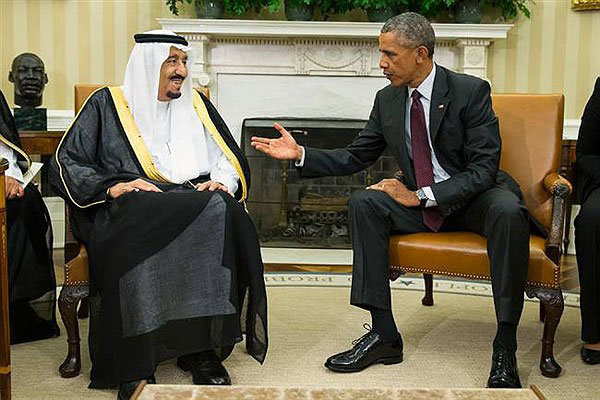Arabs taking U.S. national security hostage

President Obama’s foreign policy legacy will have a lasting impact on the U.S. international security in general and the Middle East in particular for years to come.
Obama opines that warmongering is no longer an option and the U.S. is better off coming to grips with realities and necessities of the modern political era.
The president’s change of tack has some supporters from within American political circles. However, First Lady Michelle Obama certainly will not be happy to hear that we decline to call her Barack “Saint Obama.” Instead, we would like to launch the most scathing attacks on him for not following a clear, strong foreign policy because it has ended in a global community akin to what we wished to distance from after the Bush administration.
In defending his foreign policies and its slow-witted approach, Obama cannot say he is right simply because he has come in for a lot of flak from the conservative Arab caliphs. Obama’s conservatism has resulted in at least two dangerous consequences.
Initially, it has fueled war and insecurity in a region whose serenity is of critical importance for the whole world: the Middle East and the embattled Iraq, Syria, and Yemen. And secondly, Arab countries’ clear intervention and ambitiousness, and finally, their keeping U.S. foreign policy and national security as a hostage.
There are numerous instances to support the above mentioned stance with Saudi Arabia’s reaction to the nuclear deal Iran clinched with Western powers as a case in point.
There is no doubt that the Obama administration struck a best deal with Iran and likewise, President Rouhani has turned Iran into a unique opportunity in international arena. But Obama’s lack of strict and defined policy towards Arabs after the JCPOA has made them more ambitious over the past two years.
This lapse in Obama’s foreign policy has emboldened Saudi Foreign Minister Adel al-Jubeir to deliver the threat to Americans to withdraw a colossal $750-billion investment from the U.S.
Although this is by no means nothing new and U.S. intelligence services already in 2005 and 2006 unleashed similar reports, the very threatening figure indicates unambiguously that how picking up a wrong ally forced the U.S. to bow down to Saudis at the price of Americans’ national security.
Washington has to explain to the world the reason for its silence and secrecy, revealing what else it has kept under its hat when it comes to its ties with Saudis.
It is not yet clear what exactly was on the agenda during Obama’s Riyadh visit; however, one can be pretty sure it makes no difference. When Arabs are going to attend Obama’s goodbye party in less than 9 months from now, what can be expected from the visit except a genial sitting with the outgoing president?
A senior French diplomat in Berlin once quoted a Saudi official as saying that they will complain to Obama of what he did to Saudis. The French diplomat then asked the Saudi diplomat if he is sure the next U.S. president will be better than Obama, in reply to which he had said anybody other than Obama will be OK.
(By Matin Moslem)

Leave a Comment